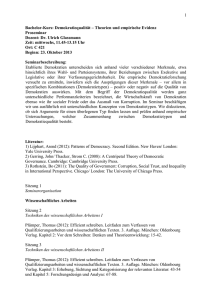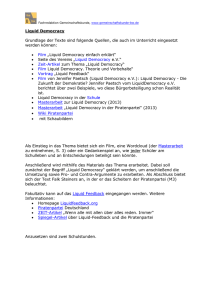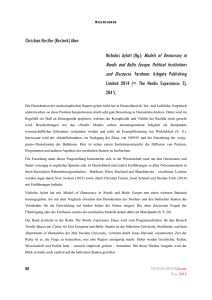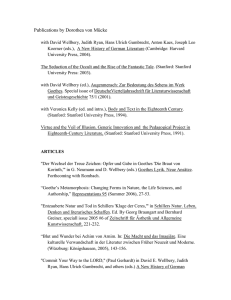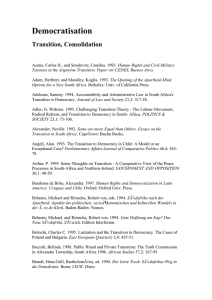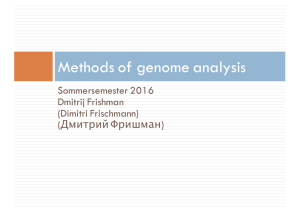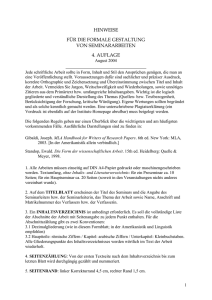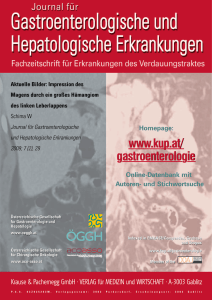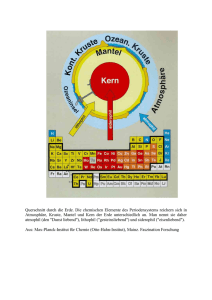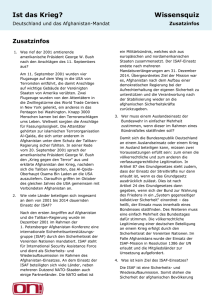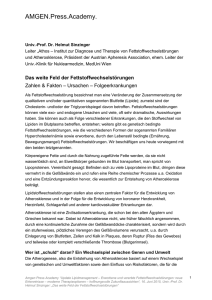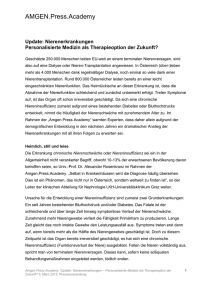WS05-06_Demokratiefoerderung_Seminarplan
Werbung
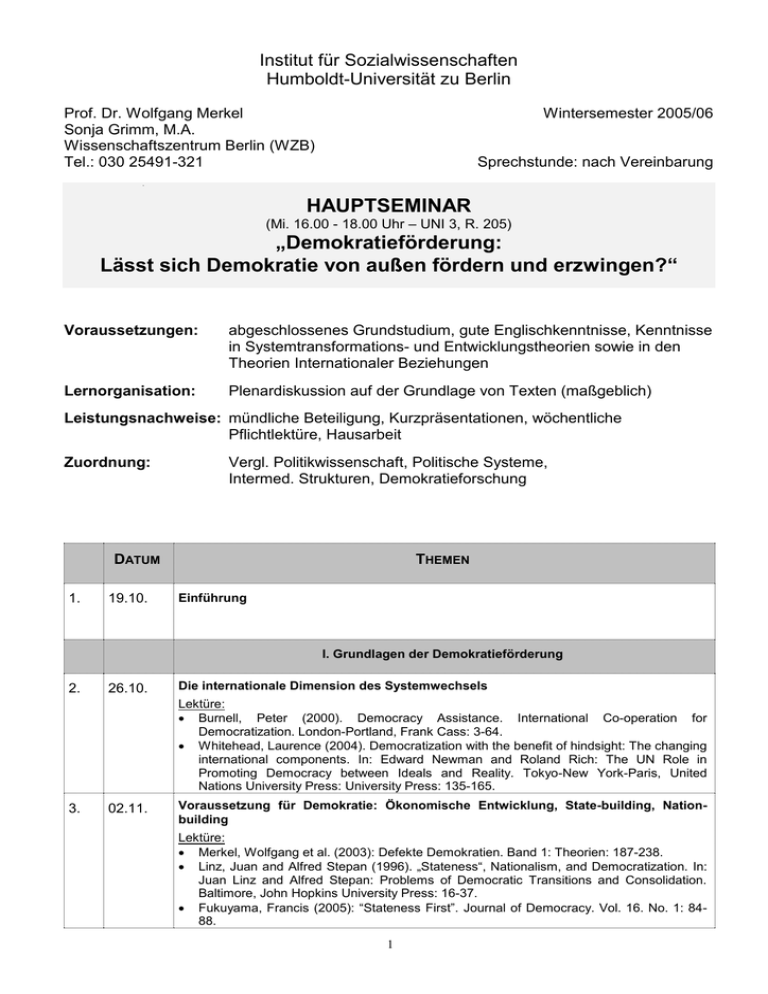
Institut für Sozialwissenschaften Humboldt-Universität zu Berlin Prof. Dr. Wolfgang Merkel Sonja Grimm, M.A. Wissenschaftszentrum Berlin (WZB) Tel.: 030 25491-321 Wintersemester 2005/06 Sprechstunde: nach Vereinbarung HAUPTSEMINAR (Mi. 16.00 - 18.00 Uhr – UNI 3, R. 205) „Demokratieförderung: Lässt sich Demokratie von außen fördern und erzwingen?“ Voraussetzungen: abgeschlossenes Grundstudium, gute Englischkenntnisse, Kenntnisse in Systemtransformations- und Entwicklungstheorien sowie in den Theorien Internationaler Beziehungen Lernorganisation: Plenardiskussion auf der Grundlage von Texten (maßgeblich) Leistungsnachweise: mündliche Beteiligung, Kurzpräsentationen, wöchentliche Pflichtlektüre, Hausarbeit Zuordnung: Vergl. Politikwissenschaft, Politische Systeme, Intermed. Strukturen, Demokratieforschung DATUM 1. 19.10. THEMEN Einführung I. Grundlagen der Demokratieförderung 2. 26.10. Die internationale Dimension des Systemwechsels Lektüre: Burnell, Peter (2000). Democracy Assistance. International Co-operation for Democratization. London-Portland, Frank Cass: 3-64. Whitehead, Laurence (2004). Democratization with the benefit of hindsight: The changing international components. In: Edward Newman and Roland Rich: The UN Role in Promoting Democracy between Ideals and Reality. Tokyo-New York-Paris, United Nations University Press: University Press: 135-165. 3. 02.11. Voraussetzung für Demokratie: Ökonomische Entwicklung, State-building, Nationbuilding Lektüre: Merkel, Wolfgang et al. (2003): Defekte Demokratien. Band 1: Theorien: 187-238. Linz, Juan and Alfred Stepan (1996). „Stateness“, Nationalism, and Democratization. In: Juan Linz and Alfred Stepan: Problems of Democratic Transitions and Consolidation. Baltimore, John Hopkins University Press: 16-37. Fukuyama, Francis (2005): “Stateness First”. Journal of Democracy. Vol. 16. No. 1: 8488. 1 4. 09.11. Entwicklungshilfe und Demokratieförderung Lektüre: Mair, Stefan (1997): „Internationale Demokratisierungshilfe“. Aus Politik und Zeitgeschichte. B43: 30-37. Carothers, Thomas (2002). "The End of the Transition Paradigm." Journal of Democracy 13(1): 5-21. 5. 16.11. Demokratieförderung in multidimensionalen Friedensoperationen: peace-keeping, peace-building, peace-enforcement, occupation Lektüre: Sisk, Timothy D. (2003) Democratization and Peace Building. Perils and Promises. In: Crocker, Chester A. and Hampson, Fen Osler: Turbulent Peace. The Challenges of Managing International Conflict. Washington: United States Institute of Peace Press: 785800. Guéhenno, Jean-Marie (2002). On the Challenges and Achievements of Reforming UN Peace Operations. In: Newman, Edward and Albrecht Schnabel, Eds. (2002). Recovering from Civil Conflict. Reconciliation, Peace and Development. London, Frank Cass: 69-80. II. Akteure und Instrumente der Demokratieförderung 6. 23.11. Nationale Demokratieförderer I: BMZ, GTZ, deutsche Stiftungen Lektüre: BMZ (2005). Förderung von Demokratie in der deutschen Entwicklungspolitik. Unterstützung politischer Reformprozesse und Beteiligung der Bevölkerung. Ein Positionspapier des BMZ. Mair, Stefan (1999). Germany’s Stiftungen and Democracy Assistance: Comparative Advantages In: Burnell, Peter (2000). Democracy Assistance. International Co-operation for Democratization. London-Portland, Frank Cass, 128-149. 7. 30.11. Nationale Demokratieförderer II: US-Regierung, USAID Lektüre: Dobbins, James F. (2003). America’s Role in Nation-building: From Germany to Iraq. Survival. Vo. 45, No.4: 87-110. Hobbson, Christopher (2005). "A forward strategy of freedom in the Middle East: US democracy promotion and the 'war on terror'." Australian Journal of International Affairs 59(1): 39-53. 8. 07.12. Regionale Demokratieförderer: EU, AU, ECOWAS, OECD Lektüre: Peck, Connie (2001). The Role of Regional Organizations in Preventing and Resolving Conflict. In: Crocker, Chester A. and Hampson, Fen Osler: Turbulent Peace. The Challenges of Managing International Conflict. Washington: United States Institute of Peace Press: 561-583. Santiso, Carlos (2002). "Promoting Democracy by Conditioning Aid? Towards a More Effective EU Development Assistance." Internationale Politik und Gesellschaft (3): 107133. 9. 14.12. Internationale Demokratieförderer: UNO, IWF, WTO Lektüre: Rich, Roland and Edward Newman (2004). Introduction: Approaching democratization policy. In: Edward Newman and Roland Rich. The UN Role in Promoting Democracy Between Ideals and Reality. Tokyo-New York-Paris, United Nations University Press: 331. Ponzio, Richard (2004). UNDP experience in long-term democracy assistance. In: Edward Newman and Roland Rich: The UN Role in Promoting Democracy between Ideals and Reality. Tokyo-New York-Paris, United Nations University Press: 208-229. 2 III. Demokratie durch Krieg 10. 21.12. Afghanistan I: Legalität und Legitimität der Intervention Lektüre: Chesterman, Simon (2004). Humanitarian Intervention and Afghanistan. In: Jennifer M. Welsh: Humanitarian Intervention and International Relations. Oxford, Oxford University Press: 163-175. Donini, Antonio (2004). Principles, Politics, and Pragmatism in the International Response to the Afghan Crisis. In: Donini, Antonio, Norah Niland and Karin Wemester: Nation-Building unravelled? Aid, Peace and Justice in Afghanistan. Bloomfield, Kumarian Press: 117-141. 11. 11.01. Afghanistan II: „Nation-building“ und „State-building“ Lektüre: Wilke, Boris (2004): Staatsbildung in Afghanistan? Zwischenbilanz der internationalen Präsenz am Hindukusch. SWP Studie 2004/S 30. Dadfar Spanta, Rangin (2005). Afghanistan: Nation-building in the Shadow of the Warlords and the “War on Terror”. In: Hippler, Jochen. Nation-building. A Key Concept for Peaceful Conflict Transformation?, London, Pluto Press: 70-80. Mardsen, Peter (2003). "Afghanistan: the Reconstruction Process." In: International Affairs, Vol. 79, No. 1: 91-105. 12. 18.01. Afghanistan III: Aufbau demokratischer Strukturen Lektüre: Komano, Kinichi (2005). "The Role of Elections in the Peace-Building and Reconstruction of Afghanistan." Asia Pacific Review 12(1): 1-16. Rubin, Barnett R. (2004). "Crafting a Constitution for Afghanistan." In: Journal of Democracy, Vol. 15, No. 3: 5-19. Goodson, Larry P. (2004). "Afghanistan in 2003: the Taliban Resurface and a new Constitution is born." In: Asian Survey. A bimonthly review of contemporary asian affairs, Vol. 44, No. 1: 14-22. 13. 25.01. Irak I: Legalität und Legitimität der Intervention Lektüre: Yoo, John (2003): "International Law and the War in Iraq." In: The American Journal of International Law, Vol. 97, No. 3: 563-576. Tomuschat, Christian (2003): "Völkerrecht ist kein Zweiklassenrecht. Der Irak-Krieg und seine Folgen." In: Vereinte Nationen. Zeitschrift für die Vereinten Nationen und ihre Sonderorganisationen, Vol. 51, No. 2: 41-46. 14. 01.02. Irak II: Problematik des „Demokratieförderers“ USA Lektüre Anderson, Liam and Gareth Stansfield (2004). The Future of Iraq. Dictatorship, Democracy, or Division? New York, Palgrave: 185-237. Jabar, Faleh A. (2004). Postconflict Iraq. A Race for Stability, Reconstruction, and Legitimacy. In: United States Institute of Peace. Special Report No. 120, May 2004. 15. 08.02. Irak III: Aufbau demokratischer Strukturen Lektüre Diamond, Larry (2005). „Lessons from Iraq.“ Journal of Democracy. Vol. 16. No. 1: 9-23. Dawisha, Adeed (2005). “The New Iraq. Democratic Institutions and Performance.” Journal of Democracy. Vol. 16. No. 3. 16. 15.02. Abschlussdiskussion Literatur: Allison, Graham T. Jr. and Robert P. Jr. Beschel (1992). "Can the United States Promote Democracy?" Political Science Quarterly 107(1): 81-98.Baskin, Mark (2003). "Review article: Post-Conflict administration and reconstruction." International Affairs 79(1): 161-170.Bastian, Sunil and Robin 3 Luckham, Eds. (2003). Can Democracy be designed? The Politics of Institutional Choice in ConflictTorn Societies. Democratic Transition in Conflict-Torn Societies. London-New York, Zed Books. Baraki, Matin (2002): "Afghanistan nach "Petersberg"." In: Blätter für deutsche und internationale Politik, Vol. 47, No. 2: 147-150. Beetham, David (2004). "Towards a universal framework for democracy assessment." Democratization 11(2): 1-17. Belloni, Roberto (2004). "Peacebuilding and Consociational Electoral Engineering in Bosnia and Herzegovina." International Peacekeeping 11(2): 334-353. Benedikter, Roland (2004). "Demokratie für den Irak? Drei Modelle im Vergleich." Österreichische Zeitschrift für Soziologie 29(1): 27-52. Bergholz, Katrin and Jenni Winterhagen (2005). Stabilität exportieren? Dokumentation einer Ringvorlesung. Interdisziplinäre Arbeitspapiere. Berlin, Osteuropa-Institut der Freien Universität Berlin. BMZ (2005). Förderung von Demokratie in der deutschen Entwicklungspolitik. Unterstützung politischer Reformprozesse und Beteiligung der Bevölkerung. Ein Positionspapier des BMZ. Bose, Sumantra (2005). "The Bosnian State a Decade after Dayton." International Peacekeeping 12(3): 322-335. Brown, Stephen (2005). "Foreign Aid and Democracy Promotion: Lessons from Africa." The European Journal of Development Research 17(2): 179 - 198. Bueno de Mesquita, Bruce, Randolph M. Siverson and Gary Woller (1992). "War and The Fate of Regimes: A Comparative Analysis." American Political Science Review 86(3): 638-646. Burnell, Peter (2000). Democracy Assistance: The State of the Discourse. Democracy Assistance. International Co-operation for Democratization. Peter Burnell. London-Portland, Frank Cass: 3-33. Burnell, Peter (2004). "Democracy Promotion: The Elusive Quest for Grand Strategies." Internationale Politik und Gesellschaft(3): 100-117. Burnell, Peter (2004). "The Domestic Political Impact of Foreign Aid: Recalibrating the Research Agenda." The European Journal of Development Research 16(2): 396-416. Burnell, Peter, Ed. (2000). Democracy Assistance. International Co-operation for Democratization. London, Frank Cass. Caplan, Richard (2002). A New Trusteeship? The International Administration of War-torn Territories. Adelphi Paper 341. The International Institute for Strategic Studies. Oxford University Press. Caplan, Richard (2004). "Partner or Patron? International Civil Administration and Local CapacityBuilding." International Peacekeeping 11(2): 229-247. Caplan, Richard (2005). "Who Guards the Guardians? International Accountability in Bosnia." International Peacekeeping 12(3): 463-476. Carapico, Sheila (2002). "Foreign Aid for Promoting Democracy in the Arab World." Middle East Journal 56(3): 379-395. Carothers, Thomas (1999). Aiding Democracy Abroad. The Learning Curve. Washington, D.C., Brookings Institution Press. Carothers, Thomas (2000). Taking Stock of Democracy Assistance. In: Michael Cox, G. John Ikenberry and Takashi Inoguchi. American Democracy Promotion. Impulses, Strategies, and Impact. Oxford-New York, Oxford University Press: 181-199. Carothers, Thomas (2002). "The End of the Transition Paradigm." Journal of Democracy 13(1): 5-21. Carothers, Thomas (2004). Critical Mission: Essays on Democracy Promotion. Washington. Carothers, Thomas and Marina S. Ottaway, Eds. (2005). Uncharted Journey: Promoting Democracy in the Middle East. Washington. Chesterman, Simon (2004). Humanitarian Intervention and Afghanistan. In: Jennifer M. Welsh: Humanitarian Intervention and International Relations. Oxford, Oxford University Press: 163-175. Chesterman, Simon (2004). You, the People. The United Nations, Transitional Administration, and State-Building. Oxford, Oxford University Press. Cobbs, Elizabeth A. (1991). U.S. Business: Self-Interest and Neutrality. Exporting Democracy. The United States and Latin America. Case Studies. Abraham F. Lowenthal. Baltimore-London, Johns Hopkins University Press: 142-173. Cox, Michael, G. John Ikenberry and Takashi Inoguchi, Eds. (2000). American Democracy Promotion. Impulses, Strategies, and Impacts. Oxford-New York, Oxford University Press. Crawford, Gordon (2003). "Promoting Democracy from Without - Learning from Within (Part I)." Democratization 10(1): 77-98. Crawford, Gordon (2003). "Promoting Democracy From Without - Learning From Within (Part II)." Democratization 10(2): 1-20. 4 Crocker, Chester A. and Hampson, Fen Osler, Eds. (2001). Turbulent Peace. The Challenges of Managing International Conflict. Washington: United States Institute of Peace Press. Czempiel, Ernst-Otto (2004). "Demokratisierung von außen. Vorhaben und Folgen." Merkur. Deutsche Zeitschrift für europäisches Denken 58(6): 467-479. Czempiel, Ernst-Otto (2005). "Strategien der Demokratisierung. Intervention und Freiheit im Zeitalter der Interdependenz." Internationale Politik 60(5): 92-101. Dadfar Spanta, Rangin (2005). Afghanistan: Nation-building in the Shadow of the Warlords and the “War on Terror”. In: Hippler, Jochen. Nation-building. A Key Concept for Peaceful Conflict Transformation? London, Pluto Press: 70-80. Dawisha, Adeed (2004). "Iraq: Setbacks, Advances, Prospects." Journal of Democracy 15(1): 5-20. Dawisha, Adeed (2005). “The New Iraq. Democratic Institutions and Performance.” Journal of Democarcy. Vol. 16. No. 3. Diamond, Larry (1991). "Promoting Democracy." Foreign Policy 87(Summer): 25-46. Diamond, Larry (1997). Promoting democracy in the 1990s: actors, instruments, and issues. In: Axel Hadenius (Ed.). Democracy's Victory and Crisis. Cambridge, Cambridge University Press: 311-370. Diamond, Larry (2002). Advancing Democratic Governance: A Global Persoective on the Status of Democracy and Directions for International Assistance. Stanfort, Hoover Institution at Stanford University. Diamond, Larry (2005). Lessons from Iraq. Journal of Democracy. Vol. 16. No. 1: 9-23. Dobbins, James F. (2003). "America's Role in Nation-Building: From Germany to Iraq." Washington, Rand Corporation. Dobbins, James F. (2005). "Iraq: Winning the Unwinnable War." Foreign Affairs 84(1): 16-25. Dobbins, James F., Seth G. Jones, Keith Crane, Andrew Rathmell, Brett Steele, Richard Teltschik and Anga Timilsina (2005). The UN's Role in Nation-Building. From the Congo to Iraq. Washington, Rand Corporation. Doh, Chull Shin (1994). "On the Third Wave of Demoratization. A Synthesis and Evaluation of Recent Theory and Research." World Politics 47(1): 135-170. Donini, Antonio (2004). Principles, Politics, and Pragmatism in the International Response to the Afghan Crisis. In: Donini, Antonio, Norah Niland and Karin Wemester: Nation-Building unravelled? Aid, Peace and Justice in Afghanistan. Bloomfield, Kumarian Press: 117-141. Doorenspleet, Renske (2004). "The structural context of recent transitions to democracy." European Journal of Political Research 43(3): 309-335. Eizenstat, Stuart E., John Edward Porter and Jeremy M. Weinstein (2005). "Rebuilding Weak States." Foreign Affairs 84(1): 134-146. Ethier, Diane (2003). "Is Democracy Promotion Effective? Comparing Conditionality and Incentives." Democratization 10(1): 99-120. Feldman, Noah (2004). What We Owe Iraq: War and the Ethics of Nation Building. Princeton, Princeton University Press. Fukuyama, Francis (2004). Staaten bauen. Die neue Herausforderung internationaler Politik. Berlin, Propläen. Fukuyama, Francis (2005): “Stateness First”. Journal of Democracy. Vol. 16. No. 1: 84-88. Gershman, Carl (2004). "Democracy promotion: the relationship of political parties and civil society." Democratization 11(3): 27-35. Goodson, Larry P. (2003). "Afghanistan's long Road to Reconstruction." In: Journal of Democracy, Vol. 14, No. 1: 82-99. Goodson, Larry P. (2004). "Afghanistan in 2003: the Taliban Resurface and a new Constitution is born." In: Asian Survey. A bimonthly review of contemporary asian affairs, Vol. 44, No. 1: 14-22. Grimm, Sonja (2004). Verpflichten Menschenrechte zur Demokratie? Über universelle Menschenrechte, politische Teilhabe und demokratische Herrschaftsordnungen. Discussion Paper SP IV 2004-201. Wissenschaftszentrum Berlin für Sozialforschung (WZB). Berlin. Gromes, Thorsten, Bernhard Moltmann and Bruno Schoch (2004). "Demokratie-Experimente in Nachbürgerkriegsgesellschaften. Bosnien und Herzegowina, Nordirland und Kosovo im Vergleich." HSFK-Report(9/2004). Guéhenno, Jean-Marie (2002). On the Challenges and Achievements of Reforming UN Peace Operations. In: Newman, Edward and Albrecht Schnabel, Eds. (2002). Recovering from Civil Conflict. Reconciliation, Peace and Development. London, Frank Cass: 69-80. Hadenius, Axel (1992). Democracy and Development. Cambridge, Cambridge University Press. Hermann, Margaret G. and Charles W. Jr. Kegley (2001). "Democracies and Intervention: Is there a Danger Zone in Democratic Peace?" Journal of Peace Research 38(2): 237-245. 5 Hippler, Jochen (2005) (Ed.) Nation-building. A Key Concept for Peaceful Conflict Transformation? London. Pluto Press. Hobbson, Christopher (2005). "A forward strategy of freedom in the Middle East: US democracy promotion and the 'war on terror'." Australian Journal of International Affairs 59(1): 39-53. Holzgrefe, J. L. and Robert O. Keohane, Eds. (2004). Humanitarian Intervention. Ethical, Legal, and Political Dilemmas. Cambridge, Cambridge University Press. Hook, Steven W. (2002). Inconsistent U.S. Efforts to Promote Democracy Abroad. In: Peter J. Schraeder: Exporting Democracy. Boulder-London, Lynne Rienner: 109-128. Huntington, Samuel P. (1997). The Clash of Civilizations. New York. Jaggers, Keith and Ted Gurr (1995). "Transitions to Democracy: Tracking the Third Wave with Polity III Indicators of Democracy and Autocracy." Journal of Peace Research 32(4): 469-483. Jarausch, Konrad (2004). Die Umkehr. Deutsche Wandlungen 1945-1995. München, Deutsche Verlagsanstalt. Knack, Stephen (2004). "Does Foreign Aid Promote Democracy?" International Studies Quarterly 48(1): 251-266. Komano, Kinichi (2005). "The Role of Elections in the Peace-Building and Reconstruction of Afghanistan." Asia Pacific Review 12(1): 1-16. Kümmel, Gerhard (1999). Internationale Einflussfaktoren bei der Konstituierung von Demokratie. In: Dirk Berg-Schlosser and Hans-Joachim Giegel. Perspektiven der Demokratie. Probleme und Chancen im Zeitalter der Globalisierung. Frankfurt-New York, Campus: 82-99. Lijphard, Arend/Waismann, Carlos H. (1996). Institutional Design in New Democracies, Boulder. Linz, Juan and Alfred Stepan (1996). „Stateness“, Nationalism, and Democratization. In: Juan Linz and Alfred Stepan: Problems of Democratic Transitions and Consolidation. Baltimore, John Hopkins University Press: 16-37. Lowenthal, Abraham F., Ed. (1991). Exporting Democracy. The United States and Latin America. Case Studies. Baltimore-London, Johns Hopkins University Press. Luttwak, Edward N. (2005). "Iraq: The Logic of Disengagement." Foreign Affairs 84(1): 26-36. Mainwaring, Scott (1992). Transitions to Democracy and Democratic Consolidation: Theoretical and Comparative Issues. Issues in Democratic Consolidation: The New South American Democracies in Comparative Perspective. Scott Mainwaring, Guillermo O'Donnell and J. Samuel Valenzuela. Notre Dame, Notre Dame University Press: 294-341. Mair, Stefan (1997): „Internationale Demokratisierungshilfe.“ Aus Politik und Zeitgeschichte. B43: 3037. Mair, Stefan (2000). Germany's Stiftungen and Democracy Assistance: Comparative Advantages, New Challenges. Democracy Assistance. International Co-operation for Democratization. Peter Burnell. London, Frank Cass: 128-149. Mansfield, Edward D. (1995). "Democratization and the Danger of War." International Security 20(1): 5-38. Mardsen, Peter (2003). "Afghanistan: the Reconstruction Process." In: International Affairs, Vol. 79, No. 1: 91-105. Meernik, James (1996). "United States Military Intervention and the Promotion of Democracy." Journal of Peace Research 33(4): 391-402. Merkel, Wolfgang (1999). Systemtransformation. Opladen, Leske+Budrich. Merkel, Wolfgang/Puhle, Hans-Jürgen (1999). Von der Diktatur zur Demokratie. Opladen, Leske und Budrich. Merkel, Wolfgang/Puhle, Hans-Jürgen/Croissant, Aurel/Eicher, Claudia/Thiery, Peter (2003). Defekte Demokratie, Bd. 1: Theorie, Opladen, Leske und Budrich. Messner, Dirk and Imme Scholz, Eds. (2005). Zukunftsfragen der Entwicklungspolitik. Baden-Baden, Nomos. Mills, Greg (2004). "Better with the UN? Searching for Peace and Governance in Iraq." Global Governance 10(3): 281-288. Minxin Pei and Sara Kasper (2003). Lessons from the Past: The American Record on Nation Building. Policy Brief No. 24, Carnegie Endowment for International Peace, http://www.ceip.org/files/pdf/Policybrief24.pdf. Newman, Edward (2004). UN democracy promotion: Comparative advantages and constraints. In: Edward Newman and Roland Rich. The UN Role in Promoting Democracy. Between Ideals and Reality. Tokyo-New York-Paris, United Nations University Press: 188-207. Newman, Edward and Albrecht Schnabel, Eds. (2002). Recovering from Civil Conflict. Reconciliation, Peace and Development. London, Frank Cass. 6 Newman, Edward and Roland Rich, Eds. (2004). The UN role in promoting democracy: Between ideals and reality. Tokyo-New York-Paris, United Nations University Press. Nitzscke, Heiko and Kaysie Studdard (2005). "The Legacies of War Economies: Challenges and Options for Peacemaking and Peacebuilding." International Peacekeeping 12(2): 222-239. O'Donnell, Guillermo (1992). Transitions, Continuities, and Paradoxes. In: Scott Mainwaring, Guillermo O'Donnell and J. Samuel Valenzuela (Eds.). Issues in Democratic Consolidation: The New South American Democracies in Comparative Perspective. Notre Dame, Notre Dame University Press: 1756. O'Donnell, Guillermo and Philippe C. Schmitter, Eds. (1989). Transitions from Authoritarian Rule. Tentative Conclusions about Uncertain Democracies. Baltimore - London, Johns Hopkins University Press. Ottaway, Marina (2003). "Promoting Democracy after Conflict: The Difficult Choices." International Studies Perspectives 4(3): 314-322. Ottaway, Marina (2003). Democracy Challenged. The Rise of Semi-Authoritarianism. Washington, Carnegie Endowment for International Peace. Paris, Roland (2004). At War's End. Building Peace After Civil Conflict. Cambridge, Cambridge University Press. Peceny, Mark (1995). "Two Paths to the Promotion of Democracy During U.S. Military Interventions." International Studies Quarterly 39(3): 371-401. Peceny, Mark (1999). "Forcing them to be free." Political Research Quarterly 52(3): 549-582. Peck, Connie (2001). The Role of Regional Organizations in Preventing and Resolving Conflict. In: Crocker, Chester A. and Hampson, Fen Osler: Turbulent Peace. The Challenges of Managing International Conflict. Washington: United States Institute of Peace Press: 561-583. Pei, Minxin (2002). "Implementing the Institutions of Democracy." International Journal on World Peace XIX(4): 3-31. Pevehouse, Jon C. (2002). "Democracy from the Outside-In? International Organizations and Democratization." International Organization 56(3): 515-549. Ponzio, Richard (2004). UNDP experience in long-term democracy assistance. Edward Newman and Roland Rich: The UN Role in Promoting Democracy between Ideals and Reality. Tokyo-New YorkParis, United Nations University Press: 208-229. Potter, David et al. (Hrsg.) (1997). Democratization. Cambridge, Cambridge University Press. Przeworski, Adam (1988). Some Problems in the Study of the Transition to Democracy. In: Guillermo O'Donnell, Philippe C. Schmitter and Laurence Whitehead (Eds.). Transitions from Authoritarian Rule. Comparative Perspectives. Baltimore - London, Johns Hopkins University Press: 47-63. Przeworski, Adam (1992). The Games of Transition. Scott Mainwaring, Guillermo O'Donnell and J. Samuel Valenzuela (Eds.). Issues in Democratic Consolidation: The New South American Democracies in Comparative Perspective. Notre Dame, Notre Dame University Press: 105-152. Przeworski, Adam (Hrsg.) (1995). Sustainable Democracy. Cambridge, Cambridge University Press. Przeworski, Adam et al. (1996). "What Makes Democracies Endure?" in: Journal of Democracy, 1: 3955. Relijic, Dusan (2005). Between Self-Determination and Multiethnicity – International Actors and Nationbuilding in Bosnia and Kosovo. In: Hippler, Jochen (Ed.) Nation-building. A Key Concept for Peaceful Conflict Transformation? London. Pluto Press: 98-110. Rich, Roland and Edward Newman (2004). Introduction: Approaching democratization policy. In: Edward Newman and Roland Rich. The UN Role in Promoting Democracy Between Ideals and Reality. Tokyo-New York-Paris, United Nations University Press: 3-31. Richter, Solveig (2005). "Frieden schaffen mit den Waffen der Demokratie? Theorie und Praxis von Demokratisierung als Friedensstrategie." Zeitschrift für Internationale Beziehungen 12(1): 77-116. Roehder, Katja (2004). Entwicklungspolitische Handlungsfelder im Kontext erodierender Staatlichkeit in Subsahara-Afrika. DIE Discussion Paper Nr. 5/2004. Deutsches Institut für Entwicklungspolitik (DIE). Bonn 2004. Rotberg, Robert I., Ed. (2004). When States Fail. Causes and Consequences. Princeton-Oxford, Princeton University Press. Rüb, Friedbert (1994). Die Herausbildung politischer Institutionen in Demokratisierungsprozessen, in: Merkel, Wolfgang (Hrsg.): Systemwechsel 1. Theorien, Ansätze und Konzeptionen. Opladen: 111137. Rubin, Barnett R. (2004). "Crafting a Constitution for Afghanistan." In: Journal of Democracy, Vol. 15, No. 3: 5-19. 7 Rüland, Jürgen and Nikolaus Werz (2002). Germany's hesitant role in promoting democracy. Exporting Democracy. Rhetoric vs. Reality. Peter J. Schraeder. Boulder-London, Lynne Rienner: 73-88. Saikal, Amin (2002). "Afghanistan after the Loya Jirga." In: Survival. The IISS Quarterly, Vol. 44, No. 3: 47-56. Santiso, Carlos (2001). "Development Cooperation and the Promotion of Democratic Governance: Promises and Dilemmas." Internationale Politik und Gesellschaft 4. Santiso, Carlos (2002). "Promoting Democracy by Conditioning Aid? Towards a More Effektive EU Development Assistance." Internationale Politik und Gesellschaft (3): 107-133. Schade, Jeanette (2005). Between Projectifs and the Formation of Countervailing Power – NGOs in Nation-building Processes. In: Hippler, Jochen (Ed.) Nation-building. A Key Concept for Peaceful Conflict Transformation? London. Pluto Press: 125-136. Schmitter, Philippe C. and Imco Brouwer (1999). Conzeptualizing Research and Evaluating Democracy Promotion and Protection. Working Paper SPS No.99/9. Florence, European University Institute. Schmitz, Hans Peter (2004). "Domestic and Transnational Perspectives on Democratization." International Studies Review 6(3): 403-426. Schraeder, Peter J. (2002). Exporting Democracy. Boulder-London, Lynne Rienner: 1-11. Simonsen, Seven Gunnar (2004). "Nationbuilding as Peacebuilding: Racing to Define the Kosovar." International Peacekeeping 11(2): 289-311. Sisk, Timothy D. (2003) Democratization and Peace Building. Perils and Promises. In: Crocker, Chester A. and Hampson, Fen Osler: Turbulent Peace. The Challenges of Managing International Conflict. Washington: United States Institute of Peace Press: 785-800. Stephan, Afred (1988). Paths toward Redemocratization: Theoretical and Comparative Considerations. Transitions from Authoritarian Rule. Comparative Perspectives. Guillermo O'Donnell, Philippe C. Schmitter and Laurence Whitehead. Baltimore - London, Johns Hopkins University Press. 3: 64-84. Tomuschat, Christian (2003): "Völkerrecht ist kein Zweiklassenrecht. Der Irak-Krieg und seine Folgen." In: Vereinte Nationen. Zeitschrift für die Vereinten Nationen und ihre Sonderorganisationen, Vol. 51, No. 2: 41-46. Walzer, Michael (2004). Arguing about War. New Haven & London, Yale University Press. Wardak, Ali (2004). "Building a post-war Justice System in Afghanistan." In: Crime, Law & Social Change, Vol. 41, No. 4: 319-341. Werner, Suzanne (1996). "Absolute and Limited War: The Possibility of Foreign-Imposed Regime Change." International Interactions 22(1): 67-88. Werner, Suzanne and Amy Yuen (2005). "Making and Keeping Peace." International Organization 59(2): 261-292. Whitehead, Laurence (1996). Three International Dimensions of Democratization. In: ders. Ed.: The International Dimensions of Democratization. Europe and Americas. Oxford - New York, Oxford University Press: 3-25. Whitehead, Laurence (1999). "The Drama of Democratization." Journal of Democracy 10(4): 84-98. Whitehead, Laurence (2004). Democratization with the benefit of hindsight: The changing international components. In: Edward Newman and Roland Rich: The UN Role in Promoting Democracy between Ideals and Reality. Tokyo-New York-Paris, United Nations University Press: University Press: 135165. Whitehead, Laurence (2003). Democratization. Theory and Experience. Oxford. Oxford University Press. Whitehead, Laurence, Ed. (1996). The International Dimensions of Democratization. Europe and the Americas. Oxford - New York, Oxford University Press. Wilke, Boris (2004): Staatsbildung in Afghanistan? Zwischenbilanz der internationalen Präsenz am Hindukusch. SWP Studie 2004/S 30. Williams, Paul D. (2005). "Review Article: International Peacekeeping: The Challenges of Statebuilding and regionalization." International Affairs 81(1): 163-174. Woodhouse, Tom and Oliver Ramsbotham (2005). "Cosmopolitan Peacekeeping and the Globalization of Security." International Peacekeeping 12(2): 139-156. Yoo, John (2003): "International Law and the War in Iraq." In: The American Journal of International Law, Vol. 97, No. 3: 563-576. Youngs, Richard (2004). "Democratic Institution-Building and Conflict Resolution: Emerging EU Approaches." International Peacekeeping 11(3): 526-543. Zakaria, Fareed (1997). "The Rise of Illiberal Democracy", Foreign Affairs, Nov./Dec.: 22-43. 8
